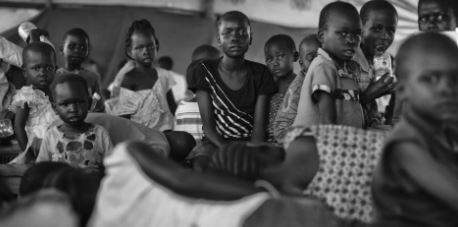At least eight children are stranded and desperate after being separated from their parents during last month’s attack by pastoralists from Jonglei State in Torit County’s Ofiriha area in Eastern Equatoria State.
According to authorities, the children include five males and three females aged 5 to 7, and they are currently at the Magwi internally displaced people’s camp.
Anyek Rose John, the Chairperson of the Eastern Equatoria State Women Association, said she is worried that some of the parents might have been killed during the attack since their whereabouts remain unknown.
“We have children who have spent some days with us, and we have failed to find their parents and close relatives to care for them. Their situation in the IDP camp is challenging because there is no food, medicine, and even clothing,” she explained. “It is the community contributing to support the children who are with us in the IDP camp because their parents fled from Ofiriha in Western Torit. These children ran their way, and their parent also ran their way. We were informed that some children were on the road, and we looked for means for them to be brought here. They are eight in number and aged between 5 and 7.”
Anyek appealed to the government and humanitarian agencies to quickly intervene and assist the children and women in Magwi IDP camp.
“If the cattle herders have problems amongst themselves, they should not create tension by transferring them to innocent people who are not cattle keepers,” she stated.
For her part, Ihure Anatazia Tukai, Secretary General of the Eastern Equatoria State Women Association, said cattle movements, if not well addressed, will create tribal conflicts. She expresses concern over the movement of Dinka Bor herders and their cattle to Magwi and Torit counties, saying it contributes to suffering, displacement, and loss of lives.
“We are deeply concerned about the influx of Dinka Bor cattle herders to Magwi and Torit counties since 2022 because it contributes to suffering, displacement, and loss of lives and is the cause of this unfortunate situation in Magwi and Western Torit,” she said. “If the ongoing cattle raiding all over the country is not addressed, it will amount to intertribal conflicts that will threaten national peace and coexistence.”
Meanwhile, Kizito Mathew Onuha, a restoring family links officer at the South Sudan Red Cross Torit Branch, said they are collaborating with partners to provide basic needs but cannot currently conduct family tracing because the situation on the ground remains tense.
“We do not rush to do tracing activities when an incident has just happened because the family members might be somewhere in the bushes, and they might not be able to come and get their kids immediately,” he explained. “We normally give time, maybe two months, before we start tracing activities. We also need to collaborate with other actors to help in terms of food, medicines, and other basic needs.”




